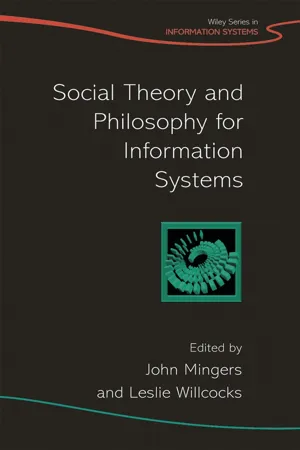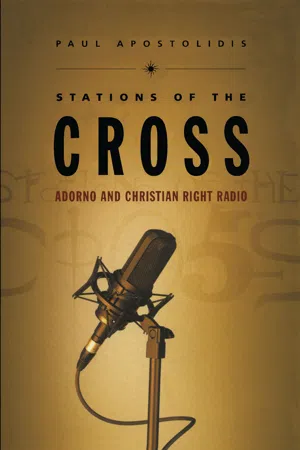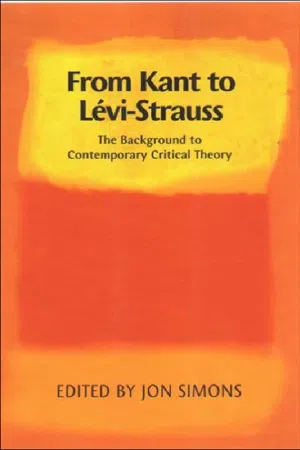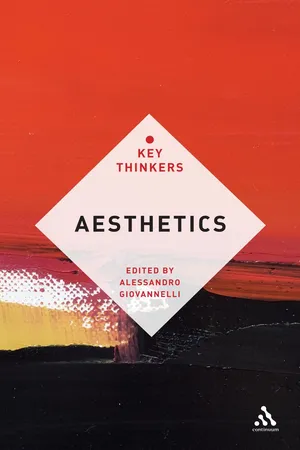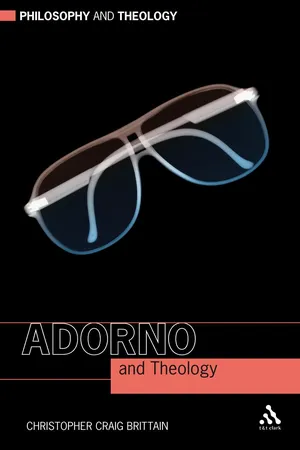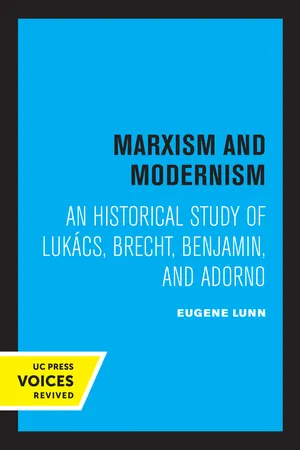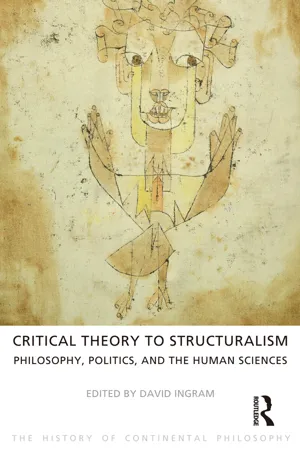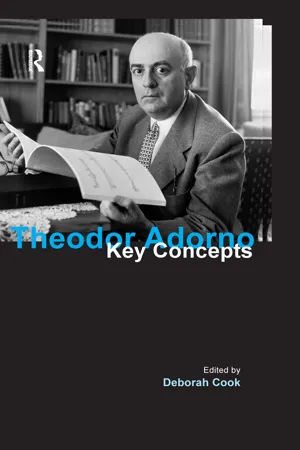Psychology
Adorno's Theory
Adorno's Theory, developed by Theodor Adorno, is a critical theory that focuses on the role of culture and mass media in shaping individuals' thoughts and behaviors. It emphasizes the impact of societal structures and the manipulation of individuals by powerful forces. Adorno's Theory is known for its examination of the effects of authoritarianism and the potential for resistance through critical consciousness.
Written by Perlego with AI-assistance
Related key terms
1 of 5
10 Key excerpts on "Adorno's Theory"
- eBook - PDF
- Ian Forbes, Steve Smith(Authors)
- 2016(Publication Date)
- Bloomsbury Academic(Publisher)
. . . In the present age . . . a compulsive sense of guilt, taking the form of a continual readiness to be sacrificed, renders fruitless any criticisms of the real causes of trouble. 17 Critical Theory and human nature 9 1 The book in which Horkheimer's essay appeared, Studien tiber Autoritat und Familie, also contained an essay by Fromm devoted to the social pscyhological aspects of authority and the family. Adorno's interest in psychology predated his membership of the Institute and continued subsequently. In the 1940s he participated in an extensive study on authoritarianism and was one of the authors of The Authoritarian Personality, a fruit of this project. In short, by the time Adorno came to write his 1955 essay, 'Sociology and Psychology', the Frankfurt School could look back on more than two decades of work on psychological topics. 18 In his analysis of the psychological dimension, Adorno, like Horkheimer and Marcuse, was predominantly influenced by the work of Freud. All three were at pains to defend Freud's work against what they saw as misguided criticisms and revisions, and they would even rap over the knuckles Freud himself when they considered he was undermining his own achievements. However, the three men did not share a common perspective on Freud. Whereas Marcuse detected a 'hidden trend in psycho-analysis', 19 which both indicated the contemporary world and pointed towards possible liberation, Horkheimer (after the 1930s) and Adorno used Freud's work in a more limited and less optimistic sense to indicate the fragmentation of the individual under capitalism. As Adorno wrote in 1946: The greatness of Freud consists in that, like all great bourgeois thinkers, he left standing undissolved such contradictions and disdained the assertion of pretended harmony where the thing itself is contradictory. He revealed the antagonistic character of the social reality. - John Mingers, Leslie P. Willcocks, John Mingers, Leslie P. Willcocks(Authors)
- 2005(Publication Date)
- Wiley(Publisher)
3. Adorno was also concerned with (and developed theories about) the role of technology in modern societies. However, these argu- ments are subtly different from the more typical or standard arguments about the role of technology in society. These differ- ences will be explored later. 4. Whatever one thinks about Adorno’s individual analyses, there is a systemic dimension to his thought. All the individual analyses (be they in critiques of astrology, jazz or administrative systems) are actually tightly interwoven and form a coherent whole. As Jarvis puts it, ‘Why does Adorno remain such a powerful force in fields as different as philosophy, musicology and social theory? One reason is the startling inner coherence of his thought. Adorno illuminated an extraordinary range of subjects in his lifetime. . . Yet despite this, the central motifs of his thought remain remarkably stable’ (Jarvis, 1998, p. 1). The aim of this chapter will not be to develop an understanding of the inner thought of Adorno—that would be far too ambitious in a work of this length (ample references will be provided for the reader who wishes to do this). Rather, it is to show how these thoughts might be relevant to researching the field of information systems, and to provide some practical guidelines for applying these notions. The field of information systems (IS) and the research topics in this field are highly diversified. Therefore, it is important to note that this chapter is concerned with developing research approaches for applicability in the area of IS practice. IS practice is (of course) a highly diversified field in its own right. One might investigate how a lone analyst programmer develops a small database, how a team develops an ambulance control system, or how the IS strategy group of a large corporation makes decisions as to whether to outsource all (part or some) of that corporation’s IS function and 132 Adorno: A Critical Theory its associated information systems.- eBook - PDF
Stations of the Cross
Adorno and Christian Right Radio
- Paul Apostolidis(Author)
- 2000(Publication Date)
- Duke University Press Books(Publisher)
But Adorno’s texts are unusual in the intensity and centrality that the exhortation toward cultural criticism assumes 32 Stations of the Cross within them. For Adorno, it was both intellectually axiomatic and histor-ically imperative to recognize that theory which dismissed intellectual and artistic phenomena as ‘‘mere ideology’’—that is, as essentially just instruments for perpetuating class domination—was itself ideological. Aspiring to critical insight into society meant resisting the delusion that abstract, social-theoretical categories provided all the knowledge of their objects that was needed to penetrate ideology. Instead, Adorno argued, under late capitalism critical thinking hinged on subjectivity preserving a critical, yet also empathetic and spontaneous, experience of the cultural object. For Adorno, engaging cultural phenomena in this way could gener-ate both self-critical theory and transformative praxis, in an era when the petrifying instrumentalization of thought not only permeated bourgeois social relations but moreover threatened socialist politics from within. The major portion of this book is devoted to locating the position of Focus on the Family within the contemporary structure of U.S. society and to extracting lessons from this endeavor for critical social theory today. Adorno’s method of cultural criticism systematically informs this ac-count of Christian right radio. Before delving into the details of James Dobson’s program, therefore, it is first necessary to explain the method of dialectical criticism (or ‘‘social physiognomy’’), as Adorno conceived of it. We shall also explore the specific historical experiences, along with the distinctive social-theoretical conceptualizations of these experiences (above all, the theories of state capitalism and the culture industry), in relation to which this method was initially formulated. - eBook - PDF
From Kant to Lévi-Strauss
The Background to Contemporary Critical Theory
- Jon Simons(Author)
- 2002(Publication Date)
- Edinburgh University Press(Publisher)
The most famous of these is The Authoritarian Personality (1950). Authoritarians, broken and ren-dered weak by the power relations of their family, prop themselves up with fantasies of strength and the acceptance of hierarchy. They adopt a surface conformity to authority figures beneath which seethes a dark ambivalence, which in later life may seek displaced discharge through the projective hatred of social outgroups, especially if this course is legitimised and manipulated by powerful ruling authorities. Although Adorno contributed to these projects by drawing on Fromm and Horkheimer’s perspectives on Freud, his major methodological contribution to Frankfurt School theory meant that at a philosophical level no simple Freudo-Marxist synthesis was possible. Adorno championed a theoretical approach in which no Theodor W. Adorno and Max Horkheimer 135 dimension is privileged and in which the contradictions between different levels of analysis become the tenuous home of truth through their determination not by lack of theoretical clarity, but by real social contradiction and conflict. The ‘shotgun marriage’ 13 of Marxism and psychoanalysis could not be theoretically consum-mated in a fully coherent system. For Adorno, the recalcitrant incompatibility of psychological and social analysis is a product of the modern estrangement of individual and society, and of the child from the adult he or she will become. As we grow into the social world, we also become alienated from ourselves. Freud and Marx cannot be unified because self and society are not unified. A social psychology which subsumes the individual level under the social ends up unconsciously mimicking the situation it ought to be criticising. - eBook - PDF
- Alessandro Giovannelli(Author)
- 2012(Publication Date)
- Continuum(Publisher)
And after Benjamin’s suicide in 1940, committed while fleeing Nazi persecution, it was Adorno— while in exile in the United States and, after the war, again in Frankfurt— who, in cooperation with Benjamin’s other lifelong friend, the Jewish Studies scholar Gershom Scholem, played a central role in making Benjamin’s work known to what would become a dedicated world-wide readership. Walter Benjamin and Theodor W. Adorno 147 1. Theoretical context Context Benjamin and Adorno sometimes are referred to as members of the first generation of the so-called Frankfurt School, an influential transdisciplinary group of cultural theorists and philosophers working between the two World Wars on projects that would transform their own conceptual roots (provided by Kant, Hegel, Marx, Freud, and oth-ers) into the concepts and strategies that came to be known as “Critical Theory.” In contrast to what they considered to be the traditional bour-geois paradigm of largely affirmative modern thought—supplied by the mathematical logic undergirding Cartesianism—this group set out to devise a critical theory of experience and of society that would take into account the political implications and transformative potential of a radically dialectical perspective on the world of phenomena as it pre-sented itself to them in light of the two sibling political formations of fascism and capitalism. For all their differences in style, emphasis, and subject matter, Benjamin and Adorno, like most prominent members of the Frankfurt School, share a self-understanding of their work as inscribed within the modern aesthetic tradition that developed out of German Idealism (especially Kant and Hegel), German Romanticism (especially Hölderlin, Novalis, and Friedrich Schlegel), and aspects of Nietzsche’s thought. - eBook - PDF
- Christopher Craig Brittain(Author)
- 2010(Publication Date)
- T&T Clark(Publisher)
What is highlighted by the discussion is the central importance of the concept of the Bilderverbot for Introduction 13 understanding the description Adorno himself gives of his work: an ‘inverse theology’. Chapter 5 offers a consideration of the political implications of Adorno’s thought. The challenges confronting Adorno’s critical theory in this regard are illustrated with reference to his dispute with the German student movement in the 1960s.This is comple-mented by an analysis of his view of the relationship between theory and practice, as well as a discussion of Adorno’s relationship to Liberation Theology. The chapter closes by highlighting the role that the concept of the ‘messianic’ has in his thought, which is illustrated by placing his approach in a constellation with that of Giorgio Agamben. A prominent aspect of Adorno’s social theory is his critique of the ‘Culture Industry’. This is analysed in Chapter 6 and is contrasted with the concept of ‘spirituality,’ as well as with the prominence of rational choice theory in the contemporary study of religion. This engagement with Rodney Stark’s work, along with an illustrative discussion of the film A Beautiful Mind , demon-strates how Adorno’s critique of ideology relates to the study of religion and society, and opens up new possibilities to explore about the relationship between theology and social science. Chapter 7 brings this study to a close with some attention to Adorno’s aesthetic theory, particularly through an analysis of his philosophy of music and his concern with the question of whether poetry can be written after Auschwitz. Adorno’s efforts to ‘think with the ears’ is linked to his view of prayer as ‘attention’, and some of his fragmentary aphorisms on the nature of love are explored to help connect his aesthetic insights with a more inter-relational approach to theology. - eBook - PDF
Marxism and Modernism
An Historical Study of Lukacs, Brecht, Benjamin, and Adorno
- Eugene Lunn(Author)
- 2023(Publication Date)
- University of California Press(Publisher)
Now, in the United States, Adorno's cultural pessimism and left-wing brand of elitism deepened. Working on a Princeton University Radio Research Project under the direction of so- ciologist Paul Lazarsfeld, Adorno reacted strongly against its purely em- pirical and quantitative study of audience reception of radio programs. These techniques, he alleged, merely validated the commercial claims that the public's views were spontaneous and that the consumers were the arbiters of what was produced. Instead, only critical social theory could demonstrate the administered forms of "taste" and "choice," the production of a "reified, largely manipulable consciousness scarcely ca- pable any longer of spontaneous experience." The audiences' reactions were preformed, the internalization of the smooth "commands" of the apparatus. (Adorno arrogantly brushed aside with philosophical objec- tions any need to empirically verify such claims.) In first coming to the United States in 1938, Adorno wrote almost thirty years later, "I had not realized how far 'rationalization' and standardization had perme- ated the so-called mass media." 182 While his cultural defensiveness vis-à-vis the collective and technified forms of advanced capitalism increased in the United States, as well as his political pessimism regarding qualitative structural change, in certain ways Adorno now moved closer toward a Marxian analytical framework. American culture and society cured him, he felt, of any lin- gering idealist assumptions of the primacy or autonomy of Geist or aes- thetic cultivation. 183 The near total commodifiction of cultural life in the United States, the dominance of exchange values in a society which was 181. Rose, The Melancholy Science, p. 9; Buck-Morss, Origin of Negative Dialectics, pp. 136-138; Jay, Dialectical Imagination, p. 68. 182. Adorno, "Scientific Experiences of a European Scholar in America," The Intel- lectual Migration, ed. - Ulrich Plass(Author)
- 2013(Publication Date)
- Routledge(Publisher)
Adorno’s writings on literature are part of an anti-systematic tradition in criticism and philosophy that can best be described as nomadic and that is exemplified in the works of writers that have significantly influenced him, such as Friedrich Nietzsche, Georg Lukács, Siegfried Kracauer, Ernst Bloch, Karl Kraus, and Walter Benjamin. The influence of the latter on all of Adorno’s works, and especially on his literary criticism and his concepts of language and history, cannot be overestimated. It is misleading, however, to conflate Adorno’s thought with what intellectual history has come to refer to as “The Frankfurt School.” With respect to art and literature, there is no consistent or monolithic approach that could be reasonably identified with the Frankfurt School. Adorno’s interpretations of literature adhere to no orthodoxy of Critical Theory, and the insights and arguments they advance do not always square with the concepts and norms that intellectual historians tend to ascribe to the so-called first generation of the Frankfurt School. Assessing Adorno’s literary criticism requires far more than pointing out its position within the larger framework known as Critical Theory; it is equally important, if not more so, to contemplate the idiosyncrasies and self-conscious contradictions in Adorno’s writings on literature. An additional challenge is posed by the inconsistent use of philosophically determinate concepts. Adorno’s tendency to supplement conventional philosophical vocabulary with suggestive metaphorical terms is particularly pronounced in his literary criticism, which therefore requires bold, incisive interpretation. Paraphrasing his arguments in these essays is not sufficient to enable one to get to the substance of his writings, since his arguments cannot be neatly separated from the complicated and ironic textual operations that make his essays fascinating but also potentially uninterpretable. My intention in this study is to provide interpretations—necessarily incomplete—that go beyond what is stated directly in Adorno’s texts. Using his description of the essay as an “art of transition” as a point of departure, I seek to alert the reader not only to Adorno’s use of concepts and metaphors, but also to the larger rhetorical structures of his essays on literature.By including “history” and “language” in the title of this study, I am highlighting two terms whose significance for Adorno’s thought is evident at first glance. Yet, in typical fashion, Adorno nowhere defines these two concepts. Susan Buck-Morss has helpfully suggested that Adorno uses “history” as the dialectical opposite to “nature.”1 Perhaps Adorno’s hesitance to delineate a distinct concept of history is at least partly due to his resistance to a Marxist perspective that would ground interpretation upon dependable and predictable historical laws. His avoidance of conceptual definitions implies that his concept of language is also rather ambivalent, and in fact Adorno has no cohesive philosophy of language,2- eBook - ePub
Critical Theory to Structuralism
Philosophy, Politics and the Human Sciences
- David Ingram(Author)
- 2014(Publication Date)
- Routledge(Publisher)
Critical Models , 131.72. Theodor W. Adorno, “On Subject and Object,” in Critical Models , 253.73. Adorno, Metaphysics: Concept and Problems , 144.74. See Christopher Lasch, The Culture of Narcissism: American Life in an Age of Diminishing Expectations (New York: Warner Books, 1979).75. Theodor W. Adorno, “Sociology and Psychology,” Irving N. Wohlfarth (trans.), New Left Review 47 (January-February 1968), 79.76. Adorno, “Freudian Theory and the Pattern of Fascist Propaganda,” 124.77. “It is not an overstatement if we say that Freud, though he was hardly interested in the political phase of the problem, clearly foresaw the rise and nature of fascist mass movements in purely psychological categories” (ibid ., 120).78. Sigmund Freud, “Group Psychology and the Analysis of the Ego,” in The Penguin Freud Library, Vol. 12: Civilization, Society and Religion (Harmondsworth: Penguin, 1985), 100.79. Adorno, “Freudian Theory and the Pattern of Fascist Propaganda,” 130.80. Theodor W. Adorno, “Theory of Pseudo-Culture,” Deborah Cook (trans.), Telos 95 (Spring 1993), 32–3.81. Adorno, “Critique,” in Critical Models , 283.82. Adorno, “Opinion Delusion Society,” in Critical Models , 121.83. Ibid ., 117.84. Ibid ., 114.85. Ibid ., 119.86. Simon Jarvis, Adorno: A Critical Introduction (New York: Routledge, 1998), 83.87. Theodor W. Adorno, “Sociology and Psychology,” New Left Review 47 (January-February 1968), 88; translation modified.88. Ibid ., 95.89. Adorno, “The Meaning of Working Through the Past,” in Critical Models , 99.90. Adorno, “Discussion of Professor Adorno’s Lecture ‘The Meaning of Working Through the Past,’” in Critical Models , 298.91. Adorno, “Marginalia to Theory and Praxis,” in Critical Models , 273.92. Ibid ., 272.93. Ibid ., 272–3.94. Ibid ., 267.95. Ibid ., 262.96. Adorno, “Progress,” in Critical Models , 156.*97. Habermas’s work is discussed in more detail in an essay by Christopher F. Zurn in The History of Continental Philosophy: Volume 6 . Honneth is discussed in Amy Allen’s essay on the third generation of critical theorists in The History of Continental Philosophy: Volume 7 - eBook - ePub
Theodor Adorno
Key Concepts
- Deborah Cook(Author)
- 2014(Publication Date)
- Routledge(Publisher)
MM: 46), deserve something much better than a totally administered society never leaves him.Notes
- J . E. Grumley, History and Totality: Radical Historicism from Hegel to Foucault (1989), 169.
- Ibid., 170.
- Max Horkheimer , “The Authoritarian State”, The Essential Frankfurt School Reader (1978), 95–118.
- Axel Honneth , “A Physiognomy of the Capitalist Form of Life: A Sketch of Adorno’s Social Theory”, Constellations: An International Journal of Critical and Democratic Theory 12(1) (March 2005), 51.
- Adorno , “Television and the Patterns of Mass Culture”, Mass Culture: The Popular Arts in America (1957), 477.
- Max Horkheimer , Eclipse of Reason (1974), 139.
- Ibid., 141.
- Friedrich Pollock , “State Capitalism: Its Possibilities and Limitations”, The Essential Frankfurt School Reader (1978), 71–95.
- Ibid., 80–81.
- Erich Fromm , “The Method and Function of an Analytic Social Psychology”, The Essential Frankfurt School Reader (1978), 477–97.
- David Riesman , in collaboration with Reuel Denney & Nathan Glazer, The Lonely Crowd: A Study of the Changing American Character (1950). Cited by Adorno in “Television and the Patterns of Mass Culture”, 477.
- See Robert W . Witkin’s chapter on the philosophy of culture in this volume (Chapter 10) for further discussion of Adorno’s views about the culture industry.
- Adorno , “Television and the Patterns of Mass Culture”, 480.
- Ibid., 477.
- Honneth , “A Physiognomy of the Capitalist Form of Life”, 60.
- J . M. Bernstein, Adorno: Disenchantment and Ethics
Index pages curate the most relevant extracts from our library of academic textbooks. They’ve been created using an in-house natural language model (NLM), each adding context and meaning to key research topics.

